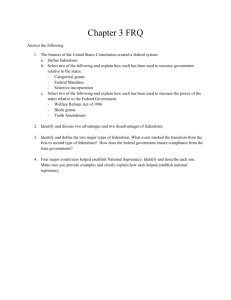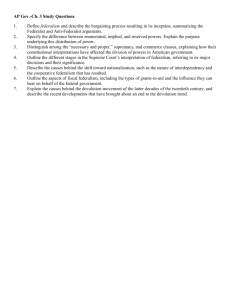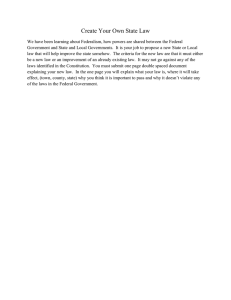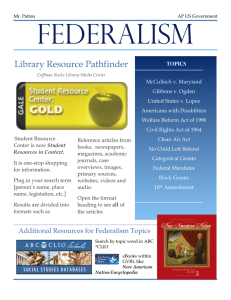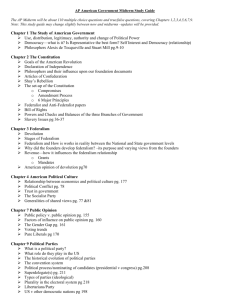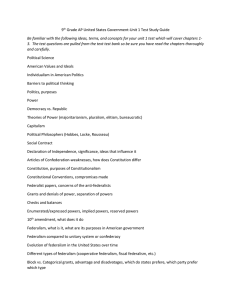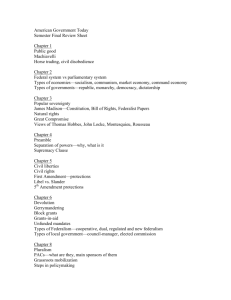SOME COMMENTS ON FIVE DECADES OF NIGERIAN FEDERALISM Abdulrasheed A. Muhammad
advertisement
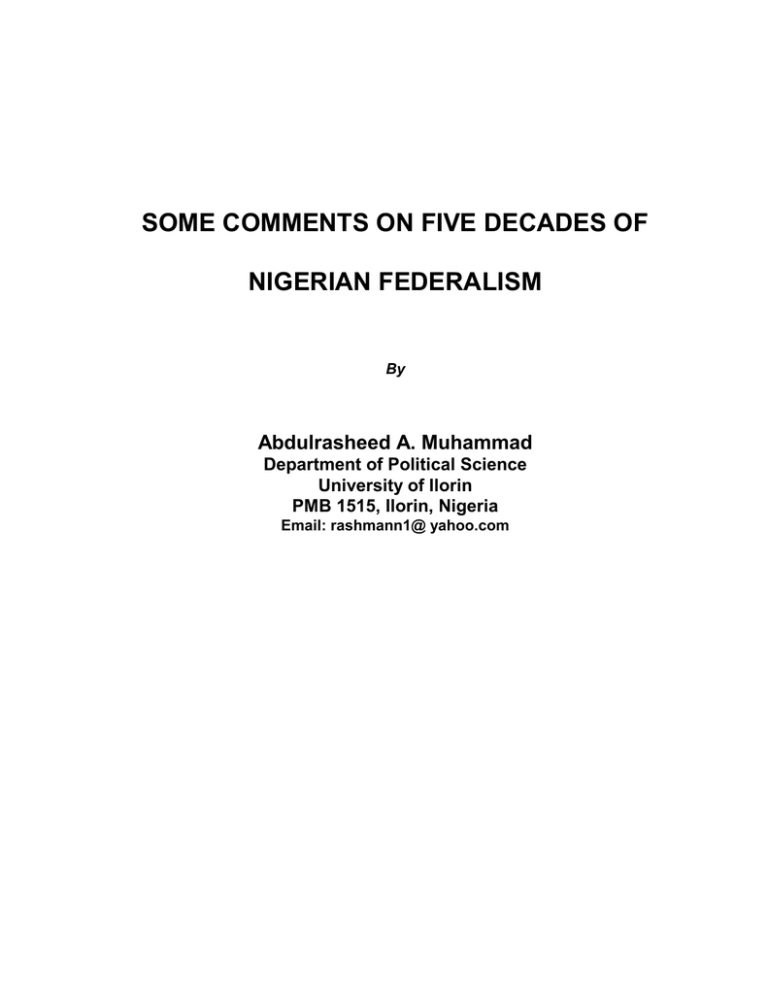
SOME COMMENTS ON FIVE DECADES OF NIGERIAN FEDERALISM By Abdulrasheed A. Muhammad Department of Political Science University of Ilorin PMB 1515, Ilorin, Nigeria Email: rashmann1@ yahoo.com 1 SOME COMMENTS ON FIVE DECADES OF NIGERIAN FEDERALISM Abstract Nigeria adopted federalism about five decades ago as safeguard against mutual fears and suspicion of domination among its various ethnic nations. Through a careful study, it is realized that its practice has been characterised by both positive and negative achievements. However, political intricacies in the country have made the negative sides more dominant and to overshadow its positive achievements as evidenced in the calls for ‘true federalism’. It is thus argued that, though the initial fears that propelled its adoption in the first place may not have been fully transcended, the system remains the best option for now. It also holds a better prospect for the future if political elites could exercise restraint in projecting its negative sides to the detriment of its positive achievements. Introduction The essence of a state is to enable the citizens achieve good life and happiness. A state is therefore a means to an end while the end is good life of the citizens. For the state to achieve the desired end, a functional relation must exist between the various segments and institutions in the state - a sort of co-operative relationship on the vertical and horizontal plane. That is, between the rulers and the ruled and, between and among the various groups in the state. In this regard, states all over the world adopt political arrangements that best suit their nature and composition and which would facilitate a substantial amount of cooperation among the various segments and institutions, all in a bid to achieve the desired end. One of such institutional arrangements especially for plural societies is the federal option. That is, a form of government where the component units of a political organisation participate in sharing powers and functions in a cooperative manner although the combined forces of ethnic pluralism and cultural diversity, among others, tend to pull them apart (Tamuno, 1998: 3). Thus, courtesy of multiplicity of its ethnic and religious groups which qualified it as a ‘plural society per excellence’ (Muhammad, 2003:9), Nigeria emerged as an independent nation-state more than four decades 2 ago under a federal arrangement meant to reconcile the various diverse elements in the country. It is important to note that the operation of the system started formally in 1954 with the adoption of Oliver Lythleton’s constitution, which guaranteed substantial autonomy to the then existing regions. Having been operated for about half a century, therefore, one is compelled to make some observations about its practice. For one thing, Nigerians are presently recounting and rejoicing on the joy and anguish of the practice of federalism federalism (Akindele, 2000: 129). These mixed feelings essentially derive from a culmination of events in the fifty years of political investment on federalism. Pertinent questions to raise here include; how has federalism fared in the country since adoption? Has the initial fears that prompted its adoption in the first place been transcended? What has been the travails and recorded gains for the country and each unit since adoption? What is the prospect of federalism in Nigeria? These problematics call for analysis. Aside from this introduction, the rest of the paper is organised into four parts beginning with a theoretical discussion on the meaning and virtues of federalism. The second part examines rationale behind Nigeria’s adoption of federalism while the third is devoted to an overview of the practice of federalism in the country. The last part concludes the paper. Federalism and its Virtues Federalism is an institutional arrangement aimed at addressing governmental problems that bothers on maintaining unity while at the same time preserving 3 diversity. It has been offered as an institutional solution to the disruptive tendencies of intra-societal ethnic pluralism (Long 1991: 192). This is because, it involves organization of the state in a manner that would promote and preserve the existing diversities within an over-arching national entity. Thus, federalism is believed to be capable of mediating the potential and actual conflicts arising from the heterogeneity within a nation-state (Akpata 2000: 8). For Elaigwu (2000; 38), It … is a compromise solution in a multinational state between two types of self-determination - the determination to maintain a supranational framework of government which guarantees security for all in the nation-state on the one hand, and protects the self-determination of component groups which seek to retain their individual identities on the other hand. K.C. Wheare (1963: 1), believed to be an articulate writer on federalism, conceived of it as an association of states formed for certain common purpose but in which the member states retain a large measure of their original independence. Though subsequent scholars have criticized him for being too legalistic in his formulation and so came up with postulations that seem somewhat a departure from his, all still revolve around a legal or constitutional framework. Models such as cooperative federalism, interdependent and, in the case of Awa (1976), mature and emergent federalism have been suggested to characterize the system essence of which, is to gain insight into its nature. It is instructive, however, to note that, rather than characterization, political realities which often impinge upon the distribution of powers between the various levels of government in a federation are what determine the nature and character of federalism. Thus, it is elusive of a universal definition. This tendency has propelled contemporary scholars to see federalism 4 more as a political ideology (Burgess, 1993a and 1993b; Chapman, 1993; Smith, 1995). Though this trend has been implicit in much of the literature on the subject matter for many years, it has however received impetus especially with the 1982 publication of Preston King, federalism and federations, wherein he drew attention to federalism as an avowedly ideological and/or philosophical position (Burgess 1993a: 3-4). Some other scholars afterwards have followed suit and even made attempts to distinguish between the concepts of federalism and federation (see Chapman, 1993; Smith 1995). For instance, Burgess argued that federalism can be taken to mean the recommendation and (sometimes) the active promotion of support for the federation, which usually manifests in structures and institutions put in place. He noted inter-alia that federalism can be an ideological position in the sense of being an overtly prescriptive guide to action (Burgess, 1993a: 12). He also noted elsewhere that, while federalism is an ideology, federation represents an action, which flows from the ideological belief and which often manifests in society’s institutional character and structures (Burgess, 1993b: 102). In a similar vein, Chapman (1993: 72) also conceived of federalism as an ideological position and added, however, that it is when such ideology is expressed that we now have federation in place. It must be added that, ideology is usually informed by experience and underlined by interest. What this translates to from our discourse so far is that federalism even if taken as an ideology is informed by certain constellation of interests while federation represents the means through which these are realized. Also, since interests do change as new situations emerge, it also follows that the 5 emergence of new group of interests, or the revitalization of old ones could provoke fresh tensions and challenges which might eventually constitute new agenda for reform (Burgess, 1993b: 105). In practical terms, the analysis so far helps situate Nigeria’s federalism. This is because, different constellations of interest mostly along territorial lines have continued to shape and re-shape the federal union especially in the post independence period. The thrust of these interests have revolved around how to work out a stable federal balance between the various ethnic nations that make up the country. To this extent, federalism in Nigeria represents an ideology adopted for managing the diverse ethnic, cultural and religious interests within the Nigerian nation. Note worthy is that what usually informed the pattern of interest constellations in the Nigerian case is the struggle for vantage position in power matrix and resource distribution. The Road to Federation in Nigeria The journey towards having a federation of Nigeria started in 1946 under the Richards constitution, which institutionalized regionalism in the country. Each of the then three regions had its constitution attached as a schedule to the Federal Constitution (Alapiki and Odondiri, 1992: 22). The federation was finally established in 1954 with the Oliver Lythleton constitution, which granted substantial autonomy to the regions in some matters including establishment of regional civil service and judicial system. Prior to these periods, the country was administered as a Unitary set up, though with some level of power devolution. It became finally consolidated at independence in 1960 when it emerged a federation delicately balanced on the 6 tripodal pedestal of the three major ethnic groups (Tyoden, 2000: 191). Scholars have advanced reasons as to why Nigeria adopted the federal system of government. But while they are agreed on the historical factors that made the adoption of federalism compelling such as diversities in nationalities, religion, culture and resources, they, however appear to differ on the political forces that propelled the historical factors in crystallizing into a federal union. Their arguments can, however, be narrowed down into two basic schools of thought. The first school, which can be described as the internalist school located the political forces that propelled the historical factors into federalism in the nationalist leaders. According to this school, the realities of the country’s historical past coupled with perceived economic advantage accruable from federalism as well as geographical and political factors made federalism attractive to the nationalist leaders before independence. The above factors were reinforced by growing suspicion and fear of domination by one group over another among the various units. Thus, it became appropriate to have a system of government that will grant units considerable freedom and autonomy in the internal governance of their people. This desire was found fulfilled in federalism since it is inherently decentralized and deconcentrated. The emphasis here is that, Nigeria’s nationalist leaders have long before independence became convinced and reached the conclusion that the country could only survive on the basis of a federal system. For instance, this was one of the arguments of Nnamdi Azikiwe, Nigeria’s first president (1960-1966), when he canvassed for a ‘federal commonwealth of Nigeria’ (Azikiwe 1945). It was also the arguments of Awolowo in his books, Path to Nigerian Freedom and Thoughts on Nigerian Constitution 7 published in 1947and 1966 respectively. Similarly, Nigeria’s first Prime Minister, Sir Abubakar Tafawa Balewa was reported to have argued the case for a federal option in the following words: I am pleased to see that we are all agreed that the federal system is, under the present conditions, the only sure basis on which Nigeria can remain United. We must recognize our diversity and the peculiar conditions under which the different tribal communities live… therefore… we must do all in our power to see that this federal system is strengthened and sustained (quoted in Elaigwu, 2000: 41 – 42). In essence, the internalist school of thought is of the view that the nationalist leaders had a strong preference for federation while the British merely rubber stamped what Nigerians themselves had desired. The second school of thought, on the other hand, sees the adoption of federalism in Nigeria as externally motivated. Federalism is here seen as a British imposition meant to serve the political interest of the British alone. It is therefore nothing but a contrivance of British rule for the purpose of administrative convenience of the colonial state apparatus (Alapiki and Odondiri 1992:21). The argument of this school is that, even before 1954 when federalism formally evolved, the country had been a conglomeration of different subcultures administered unitarily, to later introduce the federal system therefore reflects nothing but the self interest of the British. It is the belief of some scholars that contrary to the widely shared notion of achieving unity in diversity, federalism was introduced as a divide and rule strategy and to this extent was an abominable, disruptive and divisive British heritage (Awolowo, 1968: 69). Still following from this school are scholars who do not share the idea of federalism as a divide and rule strategy but rather as a 8 strategy for decolonization. Such a strategy according to Ayoade was either proposed to truncate the cost of colonial administration as in east and central Africa or to stem internal divisive tendencies as obtained in Nigeria (quoted in Ojo, 1998: 3). Yet, others have argued that the system was imposed on the country in order to maintain a neo-colonial state apparatus for effective control of the country after independence because British colonialists had the opportunity to de-emphasize the particularistic tendencies of the different ethnic groups in the country but for selfish reasons, they ended up creating ‘structural imperfections to bedevil inter-ethnic relations after independence’ (Okhaide, 1992: 544 – 545). From a synthesis of submissions by the two schools of thought discussed, certain facts become obvious about the evolution of federalism in Nigeria. It is clear that some objective factors made federalism desirable if the country is to remain united. Hence, one can hardly query the foresight of the Nationalist leaders who out of the desire to have self rule along with shared rule opted for the federal solution. Similarly, the British overlords could not have pretended not to know that it was the most appropriate for a heterogeneous society like Nigeria, though other pecuniary considerations may have influenced the choice. Added to this is that the British would not have imposed federalism in the country if circumstances had dictated otherwise. In other-words, adoption of federalism in Nigeria is neither an exclusive action of the British nor that of the nationalist leaders alone but rather, it was a mutual desire of the two parties. Watts (2000: 5) aptly made this point while describing the relevance of the federal idea in the post 1945 period. He opined that, 9 …the creators of the new states approaching independence found themselves faced with simultaneous conflicting demands for territorial integration and balkanization. They had to reconcile the need, on the one hand, for relatively large economic and political units in order to facilitate rapid economic development and to sustain genuine political independence, with the desire, on the other hand, to retain authority of the smaller political units with traditional allegiances representing racial, linguistic, ethnic and religious communities. In such situations, where the forces for integration and separation were at odds with each other, political leaders of nationalist independence movements and colonial administrators alike found in the “federal solution” a popular formula, providing a common ground for centralizers and provincialists. A pertinent question that derives from the preceding analysis is that, if mutual fears and suspicion of domination among groups, quest for self determination, economic prosperity, desire for unity in diversity among other compelling factors propelled a federation of Nigeria, to what extent then have these imperatives been transcended many years after adopting the system? This calls for an examination of the content and practice of federalism in Nigeria. Context and Content of Nigeria’s Federalism Indeed, there are certain principles on which rest the success of any federal system. Among these we may note relative equality of units in terms of decisionmaking and absence of marked inequality between them in terms of wealth, population and landmass. Also central to maintaining balance in a federation is constitutional power and revenue sharing formula, which allows each level of government to operate effectively within their jurisdictional areas as entrenched in the constitution. These factors have the potential to make or mar federal systems because they determine the stability or otherwise of federations. It is therefore within 10 this context that one can appreciate the level of ‘conflict and accommodation’ that has taken place in the Nigerian federation (Suberu, 2005). As stated earlier, Nigeria’s federalism became consolidated at independence. Since then, it has been operating in both political and fiscal contexts. The former concerns the form and structures of the federation while the latter has to do with the mode of expropriation and allocation of resources. In its form, Nigerian federalism has rotated between the excessive regionalisms that characterized the first republic to the excessive centrality of the military and to some extent, post military era. This changing form as well has been accompanied by structural changes, which have moved the federation from its initial three regions at independence to its present thirty-six states structure and local units numbering about 774. What has informed this dynamism is the desire to have a balanced federation where all nationalities will have self-fulfillment and actualization. But note worthy is that on the contrary, these changes, have only resulted in more imbalances in the federation one effect of which is that, it accentuated the centralization and concentration of power at the centre with its attendant consequences. Admittedly, states and local government creation exercises have served some useful purposes in the Nigerian federation. It has at least spread development further to the nooks and crannies, though inexhaustibly, in addition to limiting intra state rivalry1. it may however be stated that, the structural changes not withstanding, one region (north) remained dominant over others to the extent of being the decider on issues of joint deliberation. The domineering character of the northern region over others may however be traced to the origin of the federal structure in Nigeria. According to Crampton (quoted in 11 Gofwen 2004: 13), its 281,782 square miles constitute three quarters of the country’s total land area. As a result of this asymmetry, even when new states are created, the north continues to occupy more than 50 percent of states in the country2. The implication of this it that it confers on the north, as a geopolitical zone, some advantages, both in resource allocation and federal appointments, especially where the criterion of state is employed. This arrangement obviously violates one of the cardinal principles of federalism, which is that of equality of component units in a federation. To this extent, it also proved the validity of Mill’s (quoted in Oyedele, 1999: 60) law of federal instability, which asserts that no federation can be stable when one part of the federation constitutes a permanent majority in joint deliberation. Thus, Nigeria’s federalism so far with its changing structure may not have succeeded in totally reconciling the centrifugal and centripetal forces in the federation. This is manifested in the series of disenchantments expressed by groups over the federal union. In terms of fiscal practice, there is no denying the fact that in Nigeria, access to political power is a central factor in resource distribution. Therefore, a situation whereby accessibility to political power is what ultimately determines who allocate resources only provides opportunity for the controlling interest to expropriate larger percentage to its own advantage even at the detriment of the wealth producers. This was accentuated by various allocation principles adopted that tend to deemphasize derivation as the utmost determinant of resource allocation. Commenting on the fluctuating fortunes of the derivation principle in Nigeria’s revenue allocation 12 formula, Ofeimun (2005) noted from a historical perspective that from 100% in 1946, it reduced to 50% between 1951 and 1960. By 1970, it was reduced to 45 percent under General Yakubu Gowon’s administration while under the Muritala-Obasanjo’s regime, it oscillated between 20 and 25 percent. He went further that, the Shehu Shagari administration reduced it to 5 percent while under Buhari government, it was further balkanized to 1.5 percent. During Babangida regime, it appreciated to 3 percent and following series of agitations, it currently stands at 13%. Obviously, the above situation shows the extent to which issue of resource distribution is influenced by preference of the controlling interest at any particular point in time. Moreover, the principle of federalism requires that there must be sufficient resources to support both an independent general government and independent units. As argued by Wheare (1963: 51), it is not enough that the general government should be able to finance itself, it is essential too that the regional governments should be able to do likewise. If anything otherwise, Wheare maintained, no matter how much states desire a federal union or draw up a federal constitution, federal government in practice, will not be possible. This is because soon, the units or regions will either be unable to perform their functions or to do so only at a price of dependence on the central government. This assertion depicts the awkwardness in Nigerian federalism where the states are largely dependent on a domineering federal government that expropriates all resources of the nation to itself. This situation has also led some scholars to conclude that even for a long time past, 13 federalism had never existed in Nigeria in the real sense of it (Oyedele, 1999: 63) or that the practice of ‘true federalism’ in Nigeria was only between the period 1954 to 1966 (Akinyemi, 2001: 11). This latter assertion may not be unconnected with the fact that the period (1954-66) was characterized by large devolution of powers to the regions. However, following the military incursion into politics in 1966, there was a gradual but massive transfer of powers (including taxing powers) from the regions and later states to the federal government. In fact, legacies of the military on Nigerian federalism leave one with the conclusion that: the military is the architect of a centralized Nigerian federalism or better still, unitary federalism. This is because, although the initial attempt by General Aguyi Ironsi’s government (1966) to transform Nigeria into a unitary state was resisted throughout the country, the actions and policies of successive military rulers saw an interpolation of the military’s organizational and command structure into the country’s governance. Consequently, in-between the first phase of military rule (1966 - 1979) and the second phase (1983 - 1999), the country has not only had three constitutions but equally witnessed a down pruning of powers of the units. This reduction in the units’ power becomes glaring and better appreciated when we compare the 1959 constitution with especially the 1999 constitution of the Federal Republic in terms of legislative list. According to Akinyemi (2001: 11), only one item “Archives” was transferred from the 1959 exclusive legislative list to the concurrent list of 1999. No item was transferred from the 1959 exclusive list to the 1999 reserved list. Out of the twenty-eight items on the 1959 concurrent list, sixteen items -which translates to roughly 57% - were lost to the 1999 exclusive list. 14 In addition to the above, the states also lost seven items from the 1959 reserved list to the 1999 exclusive legislative list. The summation of the above analysis is that, contrary to what obtains in the periods immediately before and after independence, the Nigerian federation has become massively centralized. Although the rationale usually advanced for this is that it would curb excesses of regional governments with attendant implications for the country. But it nonetheless reduced the component units to a status not far from being satellites of the central government. It must be stated that, manifest skew-ness in resources distribution between the component units in the Nigerian federation creates conflict of interests among them. While resource endowed states insists on derivation as a major determinant in the sharing formula, the less endowed states are canvassing for other determinants such as population size, need for balanced development among others. In effect, efforts to arrive at a national consensus on the revenue sharing formula in spite of several revenue commissions have hardly yielded any acceptable outcome (Zabadi and Gambo, 2000: 75). Even the civilian administration that came into being in 1999 had to contend with this lack of consensus and the attendant agitation especially by the disadvantaged groups. One major consequence of the anomaly in federal practice in Nigeria is the unprecedented proliferation of groups championing the cause of internal autonomy and with each group trying to place its demand on the national agenda. These among others include the Oodua Peoples Congress (OPC) in the west, Bakassi boys, Egbesu movement and others in the East and, Militant Youths in the North. Thus, the country has become characterized, to a suffocating level, by persistent 15 and recurring agitations from various nationality groups all of which centered on restructuring to improve their positions in power matrix and resource distribution. Some of the issues that have been recurring for some time past include, power shift, rotational presidency, resource control, Marginalization claims, call for Sovereign National Conference, True federalism, ethnic rivalry and minorities uprising among others. More disturbing is the fact that, if the long years of interregnum in the country have been a major contributory factor to the above, the advent of democratic rule too has neither provided succour. The issues have even become more volatile with various nationality groups using all available means including violence to air their views. This has been the case with the OPC, Niger Delta Volunteer Force, Ijaw youth Congress, Bakaasi Boys and other militant groups especially in the Niger Delta. But to say all about the operation of federalism in Nigeria are negatives is to down-play its utility and relevance as a system of governance. For one, federalism is what has made Nigeria governable. This is because by virtue of its vast size, resource and diversities, the country habitate lots of power potentates competing for state power among themselves. One could have thus imagined what kind of cacophony that would emerge in the process of competing for power and resources if the country had been under a unitary system with one locus of power. But federalism by its inherent decentralization of power creates opportunities for the various power potentates to mane different spheres of interest. Thus struggle for control are to some extent diverted from the centre to other locus of power such as the state and local governments. In addition, the system allows for wider 16 participation of Nigerians in the country’s political life. This is made possible through the federal character principle that has been recurring in the country’s constitutions since 1979. The Federal character principle, according to the framers of the constitution, represents ‘the distinctive desire of the Nigerian people to promote national unity, foster national loyalty and give every citizen of Nigeria sense of belonging to the nation notwithstanding the diversities of ethnic origin, culture, language or religion…’ (See, Ayoade, 1998: 109)3. By this principle, each unit in the federation is constitutionally guaranteed an opportunity to be represented in decision-making and entire political process. Consequently, courtesy of the federal character, individuals within the federation have risen to positions of eminence on the platform of where they come from, an attainment which may not be possible were there to be level playing ground informed by merit irrespective of ethic or cultural background (Obasanjo, 1988: 61). Although the federal character may have suffered some criticisms on the ground of sacrificing merit on the alter of mediocrity among others, its utility and relevance in terms of helping to promote national unity and integration must not be wished away. Moreover, it is a way of curtailing the predominance of one unit in terms of access to decision making. Equally, the argument in some quarters that federalism has not spread even development may be one sided. This is because, existence of states and creation of new ones usually open up new opportunities while more development projects are cited. Even the federal government usually strives to establish some federal presence to be cited in newly created states. It is in this context that Onyeoziri, (2002: 14 - 15) noted that states are created to liberate minorities from the 17 stranglehold of ethnic majority groups and for more balanced development by bringing it closer to the people. While it may be admitted that in fifty years of operating the federal system, several amenities and necessities of life are still lacking, the point, however, is that provision of these amenities is not a function of federalism but of good governance. At best, federalism can only provide relative equal access to power and resources by the various groups. Beyond the above arguments, federalism in Nigeria has encouraged what Gagnon (1993: 19) termed ‘politics of innovation’. This is because autonomy of various units allows states to experiment with certain developmental programmes and policies, which other states and the federal government eventually, emulate. In other words, it creates healthy rivalry among component units. It could be recalled that establishment of the first television station in the country by the western regional government in the 1950s gingered other regions to do the same. Equally, the free education policy started first in the western region before being emulated by other parts of the country and even the federal government. Similarly, because all units exist within a federation, they often find it easier to cooperate and pull their resources together to enhance joint development. The need for cooperation is compelling because states within the federation are differently endowed while some are even confronted with similar problems necessitating joint efforts at solution. For instance, the achievement of oil producing states in the establishment of the NDDC and other attempts to have say over resources extracted from the area can be attributed to their joint endeavour. What is remarkable is that because all the states are partners in a federation, negotiations and cooperation are easily done with less 18 rigour and diplomatic rigmarole that often characterize relation among independent sovereign states. Conclusion Federalism no doubt represents an institutional mechanism through which intra societal plural elements can be accommodated and protected. The adoption of the system in Nigeria can therefore be viewed in the context of this virtue of federalism. But ever since adoption about five decades ago, the high hopes and aspirations which, propelled its adoption seem not to have been fully transcended as evidenced in series of agitations by various groups. But this cannot be attributed to failure or inefficiency of the system but rather to ineptitude and insincerity on the part of its operators and other political elites, which made all loose sight of the virtues inherent in the system. This is because competing political elites often paint the system and its operators (political leaders) at any particular time in much negativity thereby eroding its good sides from public glare. Consequently, Nigerians have not really done much in appreciating the gains of the system in about fifty years of its operation. On the contrary, what tends to be in vogue is a call for what is termed ‘true federalism’ in the country. However, the call for true federalism as a way of achieving equity and development can better be seen as politicization of federalism in Nigeria. That is, the practice of interpreting the practice of federalism to be in line with ethnic or group interest. Thus for instance, while true federalism for a southerner lies not in the introduction of sharia law in any part of the country but in achieving control over oil resources in the region, to a typical northerner (especially 19 northern Muslim), true federalism lies in the full enthronement of Sharia legal system in the region rather than regional control of resources. But as Jinadu (2004: xiii) noted, ‘there is no pure or true form of federalism’. Rather what exists is a federal spectrum along which there are variations. But this as well is not to suggest that there are no imbalances in the country’s practice of federalism. If in the least, the asymmetric structure of the federation, which creates room for marginalization and inability of the federal structure to fully redress this, is a factor to contend with. While the initial fears that propelled a federation of Nigeria may not have been transcended in its entirety, the system to a large extent has served as integration mechanism. Although there are crop of crises arising at intervals, the point still remain that there is no situation of absolute integration. More so, on the one hand, integration proceeds in phases, so Nigeria could be said to be in one of such phases and has the prospect of attaining full integration in time. On the other hand, even non-federal polities are faced with similar crises. Therefore, presence of crises cannot be said to signify bankruptcy of federalism in Nigeria. Against the background of the forgoing, it is suggested that first, political elites should exercise restraint in portraying negativity of federalism in Nigeria as against its good sides. Second, government should embark on efforts geared towards making the citizens realize the gains and good potentials of federalism in the country and third, a reorientation of the entire citizenry to make them appreciate the virtues of federalism is necessary. The expectation is that where all these are put in place, federalism holds a better prospect for the present and future generation of Nigerians. 20 Notes 1. Although this argument may be contested on ground of intra state skirmishes occurring in some areas such as lfe versus Modakeka in Osun state, Ijaw vs ilaje in Delta state among others, but the fact still remain that the spate and scope of such skirmishes could have been higher where more states are not created. 2. When Nigeria was 12 states in 1967 the North had 6 states; 1975 when it was 19 the North had 10 states; at 21 in 1989 the north had 11, while it had 16 states as at 1991 when the country was a 30 states federalism. Presently the north covers 19 out of a total number of 36 states. 3. This principle is provided for in section 14(3) of the 1979 constitution and Section 15 (3) of the 1999 constitution of the Federal Republic of Nigeria. References Akindele, R. A. (2000), ‘Redesigning Nigeria Federalism for the 21 st Century’. Nigerian Forum. Vol. 21, No. 5-6, May / June Akinyemi, A. Bolaji. (2001a), “Devolution of Power: A Prerequisite for National Unity - The Need for Dialogue”. Text of Lecture Delivered at the First Abdulrahman Okene Memorial Lecture. Kaduna, August 16. Akpata, Tayo. (2000), ‘Nigerian Nationality and the Indigene Question’. Guardian Newspaper Lagos, November 23. Alapiki, H. and Odondiri, P.G.O. (1992), ‘Federal State Relations in Nigeria’ in Henry, E.A. (ed). Human Development Issues in Nigeria. Owerri, Spring Fold Publishers PP. Awa, E.O. (1976) Issues in Federalism. Benin City, Ethiope Publishing Corporation. Awolowo, O. (1947), Path to Nigerian Freedom. London, Faber and Faber Awolowo, O. (1966), Thoughts On Nigerian Constitution. Ibadan, Oxford University Press. Awolowo, O. (1968), The Peoples Republic. Ibadan, Oxford University Press. Azikiwe, N. (1943), Political Blue Print of Nigeria. Lagos, African Books Company Ltd. Burgess, M. (1993a), ‘Federalism and Federation: A Reappraisal’ Burgess, M. and Gagnon, A (eds.) Comparative Federalism and Federation. New York, Harvester Wheatsheaf. PP 3-14. in 21 Burgess, M. (1993b) ‘Federalism As Political Ideology: Interests, Benefits and Beneficiaries in Federalism’ in, Burgess, M. and Gagnon A. (eds). Comparative Federalism and Federation. New York, Harvester Wheatsheaf. Pp. 102-114. Chapman, R.J.K. (1993), ‘Structure, Process and the Federal factor: Complexity and Enlargement in Federations’ in Burgess, M. and Gagnon, A. (eds) Comparative Federalism and Federation. New York, Harvester Wheatsheaf. Pp. 6993. Elaigwu, J.I. (2000), ‘Federalism, Institutional and Political Stability in the Context of Vision 2010’. African Journal of Federal Studies. Vol.1 No.1 PP.34-64. Gagnon, A. (1993), ‘The Political Uses of Federalism’ in Burgess, M. and Gagnon, A. (eds.), Comparative Federalism and Federation. New York, Harvester Wheatsheaf. Pp. 15 – 44 Gofwen, R. I. (2004), Religious Conflicts and Nation Building in Nothern Nigeria: The Throes of Two Decades. Kaduna, Nigeria: Human Rights Monitor Jinadu, Adele L. (2004), ‘Forword’ in Gana, Aron and Egwu, Sam (eds.), Federalism in Africa, Vol. 1: Framing the National Question. New Jersey: Africa World Press Incorporation Long, J. A. (1991), ‘federalism and Ethnic Self-Determination: Native Indians in canada’. Journal of Commonwealth and Comparative Studies. Vol. xxix (2) Muhammad, A.A. (2005)’Federalism, democracy and the National Question in Nigeria’. Paper at the National Confeence on Nigeria Under Democratic Rule, 19992003’ organised by the Department of Political Science, University of Ilorin, IlorinNigeria. August 20-21. Obasanjo, Olusegun Publications (1988), Africa Embattled. Ibadan, Nigeria: Fountain Ofeimun, O. (2005), ‘Resource Control and Beyond (2). The Guardian. Lagos, July 17 Ojo, E.O. (1998), ‘Nigerian Federalism in Historical Perspective’. Ilorin Journal of Arts and Social Sciences. Vol. 1 PP.1-9 Okhaide, P.O. (1992), ‘Federal-State Relations’ in, Imobighe, T.A. (ed.), The Politics of the Second Republic. Kuru, Nigerian Institute for Policy and Strategic Studies. PP. 535-565. Oyedele, S.O (1999) Federalism in Nigeria in, Saliu, H.A (ed.) Issues in Contemporary Political Economy of Nigeria. Ilorin, Sally and Associates. PP. 53-65. 22 Smith, G. (1995), Mapping the Federal Condition: Ideology, Political Practice and Social Justice in, Smith G. (ed.), Federalism: The Multiethnic Challenge. New York, Longman Publishers. pp. 1-28 Tamuwo, T.N. (1998), ‘Nigerian Federalism in Historical Perspective’ in Amuwo, K. et. al. (eds.), Federalism and Political Restructuring in Nigeria. Ibadan, Spectrum Books Limited PP 13-33. Tyoden, S.G. (2000), ‘Sovereign National Conference, Re-structuring, Power sharing and the Nigerian Federation’ in Alemika, E.E.O. and Okoye, F.O. (eds.) Constitutional Federalism and Democracy in Nigeria. Kaduna, Human Rights monitor. PP. 184-205. Watts, R.L. (2000), ‘The Contemporary Relevance of the Federal Idea’ African Journal of Federal Studies. Vol. 1 No.1 PP. 2-18 Wheare, K.C. (1963), Federal Government. New York, Oxford University Press. Zabadi, I.S. and Gambo, A.N. (2000), ‘Federalism and National security in Nigeria’. African Journal of Federal studies. Vol.1. No. 1 PP. 65-81.

